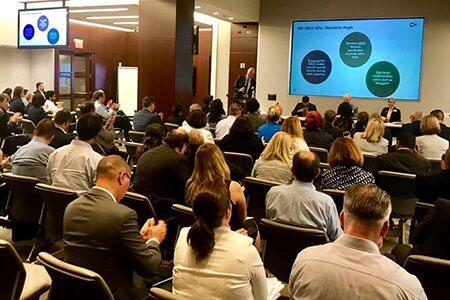Global payments systems are set for transformation in the years ahead, to become more modern and efficient, and to provide new and innovative services for consumers and businesses. While perhaps not revolutionary themselves, standards are undoubtedly key enablers of the emerging industry transformation through their critical role in financial messaging evolution.
Currently at the heart of this transformation is ISO 20022, which was the focus of recent Standards Forums, held in London on 26th April and New York City on 15th June. Forum discussions held on both sides of the pond emphasised the benefits of ISO 20022 in their respective regional contexts, and the importance of common market practices on a global scale to get the most value from the standard.
26 April 2017: London Standards Forum
The increasing ‘open source’ mentality is changing how technology is being developed and how standards can take on an even more important role in the future. For instance, the UK Payments Strategy Forum (PSF) is investigating how standards can support emerging technologies. People are increasingly convinced that having technical standards governing the use of these new technologies, be it DLTs or APIs, will bring interoperability and thus ease adoption. Digital Assets Holdings (DAH), a pioneer in DLT, is working on the technical standards to support this. The Open Banking API is already ISO 20022-enabled.
Politicians and regulators are defining new rules that impact securities post-trade operations participants. Standards are the means to pass data and business elements through transaction lifecycles, fostering common understanding to comply with reporting and regulatory requirements. In the context of financial crime compliance, there was a debate about the FATF recommendation to drop unstructured format options for address data in Swift message standards. It looks like the onus is on the global compliance community to define key components of addresses before the financial industry can appropriately reflect this at the level of message standards, leading to a ‘correct’ use of standards.
Initiatives such as CHIPS, Bank of England (CHAPS), Fedwire, Eurosystem (Target) and EBA are all moving to ISO 20022. Harmonisation around a common specification (such as HVPS+) is deemed vital to the success these and other initiatives will enjoy. HVPS+ guidelines are likely to be widely adopted by high-value payments market infrastructures around the world.
The audience was of the opinion that harmonisation of standards usage is a major contributor to interoperability, and thus globalisation. In their closing testimonials, speakers offered a number of specific messages for the audience to take home, such as: leave enough time for communities to move to ISO 20022 and keep implementation approaches simple and workable. Swift’s global payments innovation (gpi) initiative is also expected to increase interoperability between platforms, especially in the area of end-to-end tracking and Extended Remittance Information.
15 June 2017: New York City Standards Forum
A key theme of the NYC Standards Forum was the role of standards in enabling innovation. For the industry to see the benefits of innovation, banks and FinTech firms must collaborate on new technologies such as DLT and APIs. Whilst requirements and expectations at times differ between banks and FinTechs, standards are a common need where industry participants always come together to collaborate and decide how to move forward.
Spotlight on ISO 20022
The New York City standards forum highlighted that USA payments infrastructure institutions are nearing implementation of ISO 20022. Banks are struggling with current payment formats and meeting regulatory requirements for complex payments. Panellists agreed that ISO 20022, combined with Swift GPI, will bring a paradigm shift, and much of the discussion focused on implementation approaches and challenges.
Institutions will need knowledge and early curriculum development is critical. Participants also require detailed information to help inform their own decision making and strategic planning, and the details are beginning to emerge. Preparing for ISO 20022 implementation is like learning a new language and institutional payments teams need to start the learning process now, as well as engage others in their organisations. One of the current challenges for institutions involves transitioning legacy terminology (e.g., originator or beneficiary) to the enhanced ISO terminology, for example, creditor or debtor.
The Federal Reserve Bank of New York was on hand to discuss the Fed’s implementation plan, which will involve a phased approach of first changing its legacy format and converting its 7,000 US customers to ISO 20022 in waves. A stability period will follow phase one, during which customers will be able to send and receive messages in ISO format but only on a like-for-like basis with the legacy Fedwire format.

The second phase will involve a ‘big bang’ switchover to enhance ISO messaging. Whilst the ability to receive enhanced ISO will be mandatory, banks will be able to decide if they want offer enhanced ISO messages to their corporate customers. The Fed’s decision to implement in a phased approach, rather than a ‘big bang’ cutover, was due to the feasibility and risks. The Fed is working to align its plans with CHIPS, and participants expressed a desire for harmonisation in global settlement messages.
As a central market infrastructure provider, the Fed plays a critical role in leading in this direction and is providing the push that smaller banks need to move forward. Smaller institutions are following the Fed’s lead but must define their goal and the best way for their respective communities to achieve that goal.
The common trends in the UK and USA payments markets include modernisation, which is making markets more competitive, and new regulatory requirements. Whilst the US and UK differ slightly in their respective timeframes for ISO 20022 implementation, the end result will be a common and enhanced payments infrastructure. The underlying direction in both regions was clear throughout the community on the big topics: innovation, cyber, regulation and compliance, and international alignment.



